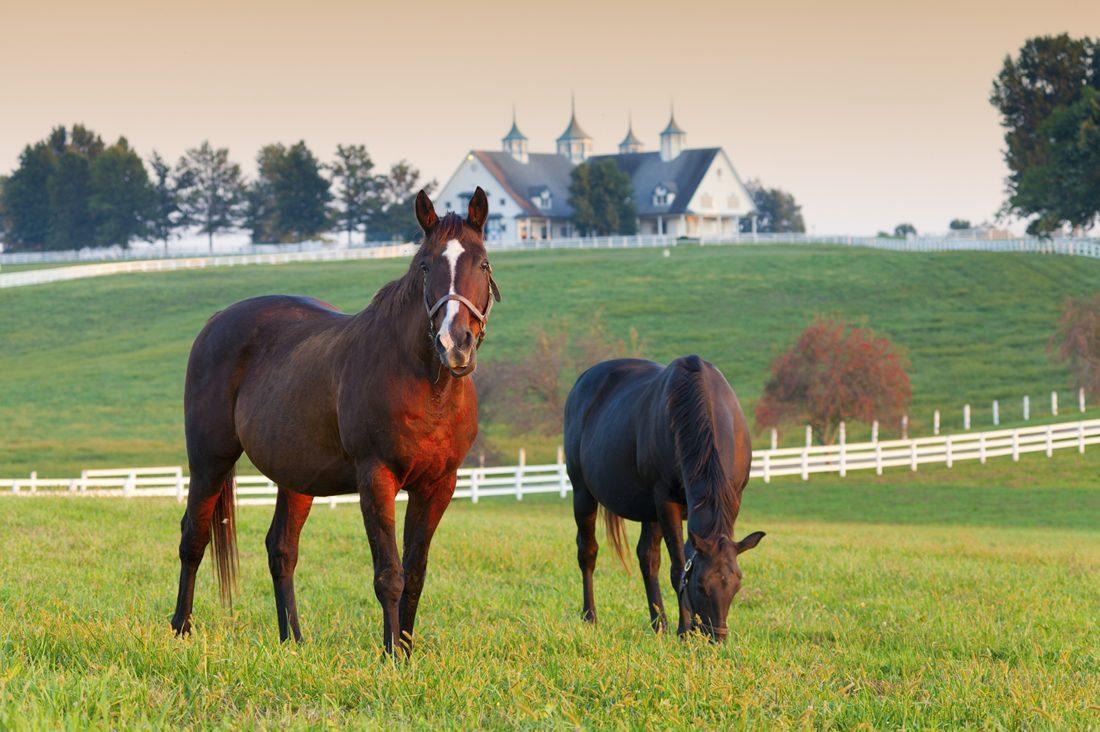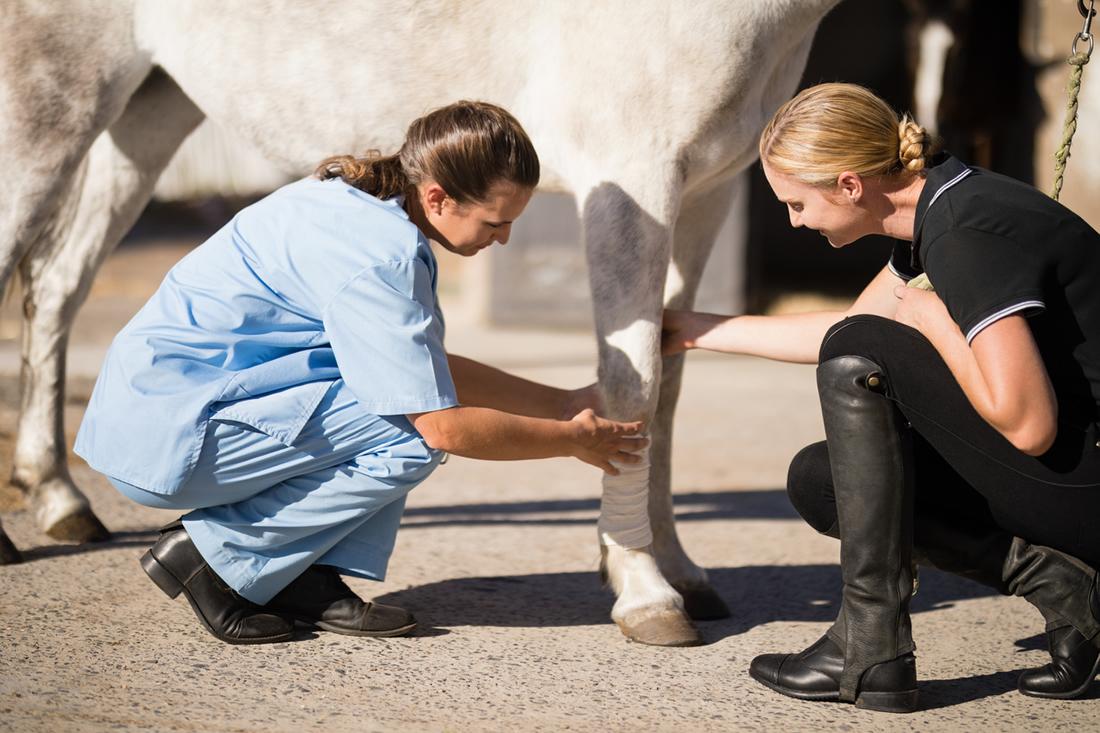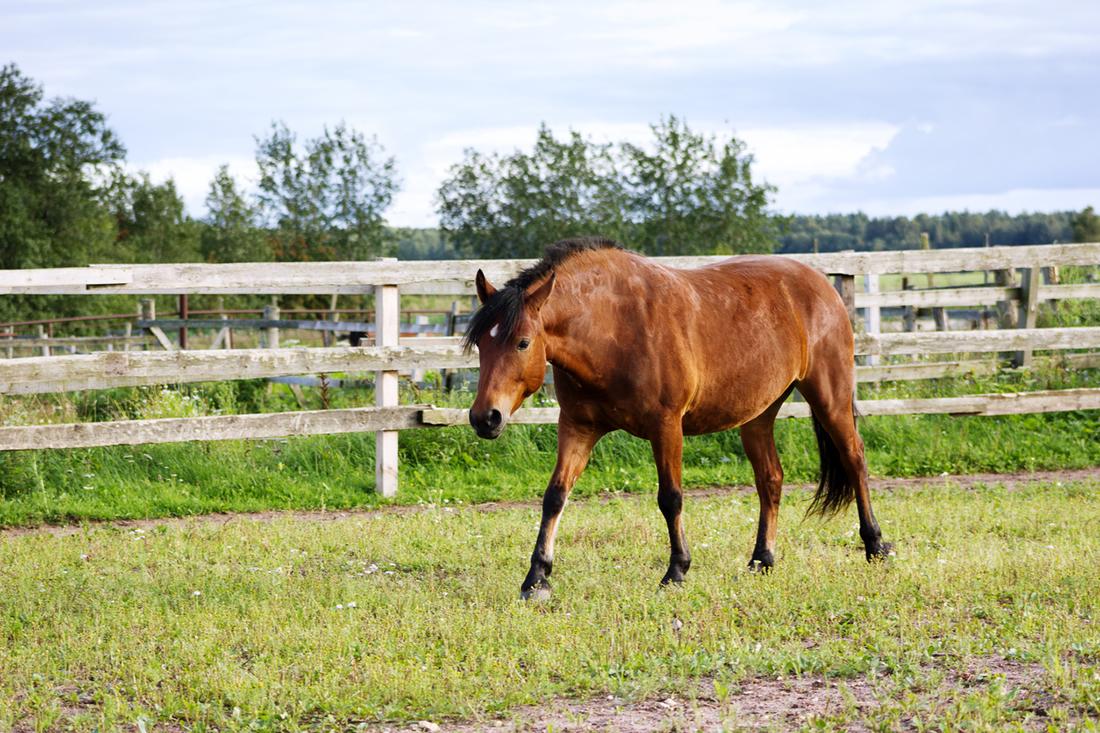Has your horse started eating or licking the soil? The ingestion of soil in animals is referred to as geophagia.
The reason some horses eat dirt is not fully understood. But the behavior is thought to serve a nutritional purpose by providing minerals and other nutrients that might be lacking in the diet. [1][2][3]
Geophagia may also be linked to boredom or stress. [1] Horses may nibble on the soil to pass the time, relieve anxiety, or alleviate stomach pain.
Geophagia can be harmful because the soil may contain parasites and other pathogens that cause illness. [2] Excessive ingestion of dirt can also damage the intestines and lead to impaction colic.
You can help to prevent your horse from practicing geophagy by providing them with a healthy forage-based diet that meets their nutritional needs.
If your horse is ingesting dirt, consult with your veterinarian to rule out any underlying medical causes and to develop a management plan to help redirect this behavior.
Why is My Horse Eating Soil?
Geophagy, also referred to as geophagia, is a behavior that involves eating dirt. [1][2][3] The condition has been observed in domesticated and wild horses and in other species including camels, buffalo, and sheep. [2]
This condition is a form of pica, the craving for and consumption of non-food items. [1] Horses may also be seen eating tree bark, wood (lignophagia), bedding, hair and manure (coprophagy).
Some expressions of geophagy may be an example of stereotypic behaviors, which are repetitive behaviours expressed to alleviate stress or boredom.
However, in some horses, the licking or eating of dirt does appear to serve a purpose. Horses may engage in geophagy because they are seeking one or more nutrients in the soil that are missing in their daily diet. [2][3]
In other species, pica is associated with amino acid deficiencies, vitamins and trace mineral deficiencies, a lack of alkaline substances, or imbalances in minerals such as the calcium to phosphorus ratio. [2]
Seeking Nutrients in Soil
Wild horses have been seen visiting the same sites repeatedly to ingest soil from specific areas. Domesticated horses have been observed performing the same behavior in paddocks and yards. [3]
The sites that horses visit when engaging in geophagia are typically small in area and returned to on multiple occasions. [3] Their return to the same sites suggests the locations are associated with a resource that may provide a physiological benefit. [3]
Research also shows that areas in which horses engage in geophagia tend to contain higher levels of iron and copper in the soil compared to control sites. [3]
Mineral deficiencies could explain why some horses eat soil, including diets that are lacking in the following minerals: [2]

Signs of Geophagy
Many horse owners become aware of geophagy by observing their horse repeatedly eating soil when turned out. But even if you don’t see your horse eating soil, a few key signs indicate a horse is engaging in geophagy.
Abnormal Particles in Manure
The presence of dirt or other foreign objects in the manure provides evidence that your horse is ingesting substances other than their regular feed.
Behavioral Changes
If your horse is observed licking or biting the ground, it may indicate that they are ingesting soil.
According to a study on the feeding habits of 35 horses across 13 sites, owners reported that 30 horses (86%) licked at the soil, 24 (69%) pawed at it, and 23 (66%) used their teeth on the soil. [3]
Changes in Eating Habits
Pay attention to any changes in your horse’s eating habits. Horses with geophagy may consume less hay and grain than normal if they are eating soil.
Complications
Geophagia is a relatively common behavior in horses, but if left unchecked it can lead to complications in the digestive tract including parasites, blockages and nutritional deficiencies.
Parasites:
Soil can contain harmful bacteria and parasites that can cause intestinal illness and infection. [2]
Some of the most common internal parasites include large strongyles, small strongyles, roundworms, tapeworms, pinworms, and bots.
These parasites can cause weight loss, diarrhea, anemia, hair loss, and colic, and transmit diseases to horses such as Cryptosporidiosis and Giardiasis.
Intestinal Blockages:
Ingesting large amounts of soil, stones and debris can lead to blockages in the gut. In severe cases, surgery may be required to remove the blockage.
Complications can include constipation, cramping, colic, loss of appetite, pain, obstruction, diarrhea, weight loss, and perforation from sharp objects such as rocks or gravel. [4]
Nutrient Deficiencies:
Geophagy may deplete the body of important nutrients and minerals, leading to poor health and decreased performance. [2]
Ingesting excessive amounts of soil and clay may result in secondary nutrient deficiencies by inhibiting the absorption of dietary iron. Soil binds to iron complexes and decreases the uptake of this macromineral from the intestines. [2]
Sand Colic:
Ingesting soil in a sandy area presents a health hazard due to sand colic. [4] This condition occurs when ingested sand accumulates in the horse’s intestines forming a hard, compacted mass.
If left untreated, sand colic can be fatal.
Causes
You may be unsure why your horse is ingesting soil, but it is important to determine the cause of geophagy to prevent the behaviour from continuing.
The causes of geophagia are often difficult to identify but may involve:
1) Nutritional Deficiencies
Horses may lick, bite or eat soil in response to a dietary deficiency. The location where horses eat soil and the timing of when horses engage in geophagy may reflect their need for certain nutrients.
Anecdotally, geophagy is said to occur primarily in horses returning to pasture in the spring. These horses are transitioning from consuming hay to spring grass after not having access to pasture or being stabled for the winter. [3]
Low Sodium
Sodium deficiency is believed to be a primary cause of soil ingestion in horses. [3] Sodium is an important electrolyte and plays a role in thirst regulation, fluid balance, muscle contractions and nerve signal transmissions.
Horses appear to have nutritional wisdom regarding their need for salt (NaCl or sodium chloride). When levels are low in the diet, they naturally seek out and voluntarily consume higher amounts of salt. [3]
Low Iron
A study comparing blood nutrient levels between 15 healthy horses and 15 horses with geophagy found that the serum concentrations of iron were lower in horses with the condition than in healthy animals. [2]
In this study, the iron-containing oxygen-transport protein, hemoglobin, was also lower in horses with pica but still within a normal physiological range compared to healthy horses. Low hemoglobin can be caused by iron deficiency. [2]
Geophagy is thought to contribute to iron deficiency because soil and clay can bind dietary iron complexes and decrease the absorption of iron through the intestinal wall. [2]
Research shows an association between a form of geophagy known as pica and iron deficiency in humans. In many cases, pica can be treated effectively by correcting depleted iron levels. [2]
Low Copper
Low copper intake is also associated with geophagia. [2][3] In the study previously mentioned, blood concentrations of copper were lower in horses with pica compared to those without the condition. [2]
This study also noted that the copper to zinc ratio was lower in horses with pica compared to those without the condition. [2]
Copper plays an important role in transporting iron across membranes and into circulation. Copper is also important for equine hoof health, skin and coat quality, immune function, joint health and more.
In one study, soil samples taken from areas where horses perform geophagia have higher iron and copper content than soil where horses do not engage in this behaviour. [3]
Other Potential Nutrient Deficiencies
Research is required to determine whether there is an association between geophagy in horses and nutrient deficiencies in amino acids, phosphorus, calcium, and cobalt.
However, studies involving other animal species suggest an association between these nutrient deficiencies and the condition. [2]
2) Stress and Boredom
Stress and boredom may contribute to geophagy in horses. [1][2] Your horse may eat soil or dirt to pass idle time or displace anxious energy.
Your horse may experience boredom if they do not get adequate turnout or exercise, are housed alone or cannot express natural behaviors. Boredom is also associated with other stereotypic behaviours and health problems.
Insufficient forage and diets primarily consisting of grain-based complete feeds can also contribute to geophagy because the horse does not spend enough time during the day eating.
You can help to prevent boredom by giving your horse more turnout in an appropriate social group, extending feeding time, providing a stimulating environment, and providing enrichment activities.
3) Stomach Discomfort
Anecdotal reports indicate that horses with stomach pain due to ulcers may eat substances such as wood and soil. Geophagy may be an attempt to soothe stomach discomfort by buffering gastric acid.
Further research is needed to confirm an association between stomach pain and wood and/or soil consumption.
Diagnosis
If you suspect your horse is engaging in geophagy, have your veterinarian perform an exam to rule out any underlying medical conditions and develop a plan to address the behavior.
Your veterinarian will want to evaluate your horse’s gastrointestinal health to identify potential impactions or effects on gut motility. Testing for parasite infestation or other health issues could also be warranted.
You can also work with an equine nutritionist to evaluate your horse’s diet. A nutritionist can assess your horse’s feeding plan to determine whether there are any nutrient deficiencies or imbalances that could be contributing to the problem.
A nutritionist will also assess management factors including forage availability, access to water, activity level and the general environment for potential causes of the behavior.
If your horse is healthy, has an adequate diet, and has no other causative factors for geophagy, the condition may be related to curiosity or boredom.
Treatment
Treatment for chronic soil ingestion depends on the underlying cause of the behavior. Most horses can overcome geophagia and live healthy lives with proper treatment.
Treatment will focus on eliminating the behaviour and mitigating complications, such as intestinal blockages or parasites.
Nutritional supplements may be necessary to correct mineral imbalances that are causing your horse to ingest dirt. Your horse may require supplemental sodium, copper, zinc, iron, cobalt, calcium, or phosphorus to restore normal mineral levels. [2][3]
It is recommended to have your horse’s hay analyzed and feed a balanced vitamin and mineral supplement to correct for common deficiencies.
Access to forage, adequate turnout time with a social group, and enriching activities can help to reduce stress, anxiety, and boredom-related geophagy.
To reduce complications from geophagy, ensure your horse has constant access to clean water and feed salt to promote water intake.
Consumption of water promotes the transit of feed and other particles through the gastrointestinal tract, reducing the risk of sand colic or intestinal blockages.
Prevention
Occasional episodes of eating soil are normal and should not cause concern for horse owners. However, you can implement the following strategies to help support natural behaviours and potentially prevent geophagia from becoming chronic and more problematic:
Provide a Forage-Based Diet
Provide sufficient long-stem forage to support gut health, help prevent ulcers, and reduce boredom. This requires choosing hay that meets your horse’s needs, allowing them to have constant access to forage.
Consult with your vet if you notice your horse is not consuming forages properly. This is common in senior horses or those with dental issues.
Encourage Natural Feeding Behavior
In the case of hay shortages or rationing the hay, use a slow-feeder hay net to extend the amount of time forage is available.
This can help to minimize gut health issues, boredom and stress related to low-forage intake. [5]
Feed a Balanced Diet
Consult an equine nutritionist to ensure your horse’s diet is properly balanced and provides adequate levels of essential vitamins and minerals.
Supplement your horse’s diet with a balanced vitamin and mineral supplement, such as Mad Barn’s Omneity or AminoTrace+.
Ensure Sufficient Exercise and Socialization
Provide plenty of turnout time to encourage exercise and socialization. Allowing positive social interactions can lower their stress and reduce the risk of stereotypies. [6][7]
In contrast, social disruption can increase stress and contribute to gastric discomfort. [8]
Give Your Horse Enough Salt
Ensure your horse’s diet contains enough salt. Most horses benefit from being fed 1 – 2 tablespoons of loose salt per day. They should also have loose, free-choice salt available at all times to voluntarily increase their salt intake as needed. Access to a salt block may not provide enough of this mineral. [9]
Address Stomach Pain
Help prevent gastric ulcers by ensuring a forage-first diet that maximizes forage intake and limits high-grain meals. Gastric pain may be contributing to geophagia in your horse.
If you notice common signs of gastric ulcers such as girthiness, aggression or changes in appetite consider consulting with an equine nutritionist to adjust their diet in support of gastric health.
Feeding a nutritional supplement such as Mad Barn’s Visceral+ can also support a healthy gastric environment.
Support Digestive Health
Maximize your horse’s nutrient absorption by feeding gut health-promoting ingredients including probiotics and yeast. These are included in Mad Barn’s Visceral+, Optimum Digestive Health, and Optimum Probiotic.
References
- Ralston, SL. Feeding behavior. Vet Clin North Am Equine Pract. 1986.
- Aytekin, I. et al. Changes in serum mineral concentrations, biochemical and hematological parameters in horses with pica. Biol Trace Elem Res. 2011.
- McGreevy, PD. et al. Geophagia in horses: a short note on 13 cases. Appl Anim Behav Sci. 2001.
- Jurjanz, S. et al. Ingestion of Soil by Grazing Sport Horses. Animals. 2021.
- Rochais, C. et al. “Hay-bags” and “Slow feeders”: Testing their impact on horse behaviour and welfare. Appl Anim Behav Sci. 2018.
- Sauveroche, M. et al. Hair cortisol in horses (Equus caballus) in relation to management regimes, personality, and breed. J Vet Behav. 2020.
- Hepburn, R. Gastric Ulceration in Horses. Equine Pract. 2011.
- York, C.A. and Schulte, B.A. The relationship of dominance, reproductive state and stress in female horses (Equus caballus). Behav Processes. 2014.
- Jansson, A. and Dahlborn, K. Effects of feeding frequency and voluntary salt intake on fluid and electrolyte regulation in athletic horses. J Appl Physiol. 1999.

![Why is My Horse Eating Soil? – [Geophagia Causes & Prevention]](https://madbarn.ca/wp-content/uploads/2022/09/How-to-Stop-Horse-Eating-Soil.jpg)












Leave A Comment